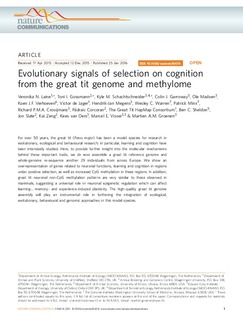Evolutionary signals of selection on cognition from the great tit genome and methylome
Laine, Veronika N.; Gossmann, Toni; Schachtschneider, Kyle M.; Garroway, Colin J.; Madsen, Ole; Verhoeven, Koen J.F.; de Jager, Victor; Megens, Hendrik-Jan; Warren, Wesley C.; Minx, Patrick; Crooijmans, Richard P.M.A.; Corcoran, Pádraic; Adriaensen, Frank; Belda, Eduardo; Bushuev, Andrey; Cichon, Mariusz; Charmantier, Anne; Dingemanse, Niels; Doligez, Blandine; Eeva, Tapio; Erikstad, Kjell E; Fedorov, Slava; Hau, Michaela; Hille, Sabine; Hinde, Camilla; Kempenaers, Bart; Kerimov, Anvar; Krist, Milos; Mand, Raivo; Matthysen, Erik; Nager, Reudi; Norte, Claudia; Orell, Markku; Richner, Heinz; Slagsvold, Tore; Tilgar, Vallo; Tinbergen, Joost; Torok, Janos; Tschirren, Barbara; Yuta, Tera; Sheldon, Ben C.; Slate, Jon; Zeng, Kai; van Oers, Kees; Visser, Marcel E.; Groenen, Martien A.M.
Journal article, Peer reviewed
Published version

Åpne
Permanent lenke
http://hdl.handle.net/11250/2506094Utgivelsesdato
2016Metadata
Vis full innførselSamlinger
- Publikasjoner fra CRIStin - NINA [2364]
- Scientific publications [1392]
Originalversjon
10.1038/ncomms10474Sammendrag
For over 50 years, the great tit (Parus major) has been a model species for research in
evolutionary, ecological and behavioural research; in particular, learning and cognition have
been intensively studied. Here, to provide further insight into the molecular mechanisms
behind these important traits, we de novo assemble a great tit reference genome and
whole-genome re-sequence another 29 individuals from across Europe. We show an
overrepresentation of genes related to neuronal functions, learning and cognition in regions
under positive selection, as well as increased CpG methylation in these regions. In addition,
great tit neuronal non-CpG methylation patterns are very similar to those observed in
mammals, suggesting a universal role in neuronal epigenetic regulation which can affect
learning-, memory- and experience-induced plasticity. The high-quality great tit genome
assembly will play an instrumental role in furthering the integration of ecological,
evolutionary, behavioural and genomic approaches in this model species.
